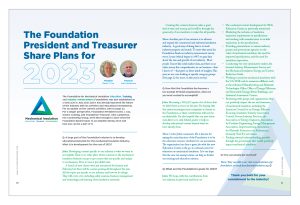The Foundation President and Treasurer Share Plans for 2023
The Foundation for Mechanical Insulation Education, Training, and Industry Advancement (Foundation) was just established as a 501(c)(3) in July 2021, but it has already improved the future of the industry with its activities and educational investments. For an update on the current activities, turn to page 22. For a longer perspective, Foundation President David J. Cox, Owens Corning, and Foundation Treasurer John Lamberton, Irex Contracting Group, were kind enough to share what the Foundation Board hopes to accomplish during 2023 and how you can be a part of it.
Q: A large part of the Foundation’s mission is to develop educational materials for the mechanical insulation industry. What is in development for the rest of 2023?
John: Developing content specific to our industry is what we want to accomplish. There is no other place where someone in the mechanical insulation business can go to get courses that are specific and unique to our business. Prior to now, it just didn’t exist.
A bunch of new classes were just announced for January and February, but there will be courses posting all throughout the year. All the topics are specific to our industry and how we do things. They will cover a lot, including safety sessions, business management and technology, and learning about insulation materials.
Creating this content, however, takes a great deal of time and money, and it will be through the generosity of our members to make this all possible.
Dave: Another part of our mission is to advance and expand the commercial and industrial insulation industry. A good way of doing that is to track industry progress and trends. To meet that need, the Foundation funds an industry measurement survey every 2 years (which began in 1997) to gain data about the size and growth of our industry. Most people I know like solid market data, and there is no other survey this comprehensive in our business—that I know of —that gives us these kinds of insights. This year, we are even looking at specific category groups. (See page 22 for more on this year’s survey.)
Q: Now that the Foundation has become a tax-exempt 501(c)(3) organization, what are you most excited to accomplish?
John: Becoming a 501(c)(3) opens a lot of doors that we didn’t have access to in the past. I’m hoping that this status encourages more companies to donate to the Foundation, as their contributions will now be tax deductible. I’m also hopeful that our new status may allow us to seek federal grants to help us develop educational content beyond what we have already done.
Dave: I echo John’s comments. He is known for saying the main function of the Foundation is to be the education resource incubator for our association. The organization has done a great job with the new Education Center as the go-to national source for education on mechanical insulation. It is our hope that the new tax-exempt status can help us further our training and education mission.
Q: What are the Foundation’s goals for 2023?
John: We hope, with the contributions from our industry, to give back and focus on:
- The continued content development for NIA’s Education Center, as previously mentioned.
- Marketing the inclusion of insulation inspection requirements in specifications and working with manufacturers to include inspections in the specifications.
- Providing presentations to various industry groups and government agencies on the value of mechanical insulation, the need for improved specifications, and the need for insulation inspections.
- Conducting two very informative studies, the biennial Industry Measurement Survey and the Mechanical Insulation Energy and Carbon Reduction Study.
- Working to promote mechanical insulation with the U.S. DOE and its numerous affiliates, such as the Advanced Manufacturing and Materials Technologies Office, Office of Energy Efficiency and Renewable Energy, Better Buildings, and Industrial Assessment Centers.
- Partnering with groups and organizations that can positively impact the use and awareness of mechanical insulation, including the American Council for an Energy-Efficient Economy, Insulation Industry Association Council, Process Industry Practices, the Association of Energy Engineers, Association for Facilities Engineering, Energy Management Association, Inspectioneering, Association for Materials Protection and Performance (formerly NACE), and others.
- Finding external industry funding, possibly through the government, that would positively impact mechanical insulation.
Q: How can people get involved?
Dave: They can talk to us, visit www.insulation.org/foundation, or email foundation@insulation.org.

